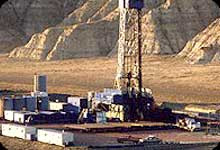"We are interested in oil and gas exploration as well as refinery and petrochemical business in India. We haven't yet seen the blocks on offer in NELP-VII (but) we will certainly consider bidding," Arcelor-Mittal executive vice president Sudhir Maheshwari told reporters here.
Mittal Investment, the company that holds Mittal family's interest in Arcelor-Mittal, on Thursday signed an MoU to take a stake in Hindustan Petroleum Corp Ltd's proposed $6-billion refinery-cum-petrochemical project at Visakhapatnam. It had earlier picked 49 per cent in HPCL's Bhatinda refinery.
"We can do ourself," Maheshwari said when asked if the company would bid alone or with a partner in the NELP-VII round, which is to be announced next month. About 65 blocks are to be offered in the seventh bidding round under New Exploration Licensing Policy (NELP).
He said his company was committed to transferring the 50 per cent stake in Caspian Investments Resources which MI had acquired from Lukoil for $980-million.
The acquisition was to be done by ONGC Mittal Energy Ltd, the equal joint venture of OVL and Mittal Investment, but the India-born billionaire went ahead on his own citing opposition to OMEL from Lukoil. He has since been delaying transferring the assets to OMEL citing opposition by Kazakhstan government.
"We have made a commitment and it will be honoured soon. It may take a few months or even a year (for the transfer to take place)," he said.
Caspian Investment Resources has equity in five Kazakh oil fields - Alibekmola, Kozhasai, Northern Buzachi, Karakuduk and Arman - in the Aktyubinsk and Mangistau regions. Current production from the fields, which have total proven reserves of some 270 million barrels, is more than 40,000 barrels per day and is set to increase in the coming years.
Kazakhstan is one of the 10 countries Mittal had originally identified for exclusive pursuit of hydrocarbon opportunities in joint venture with Oil and Natural Gas Corp (ONGC).
Some in ONGC saw the acquisition as violation of the pact unless Mittal transfers the stake to the joint venture firm, OMEL.
"Mittal had promised us that the stake will be transferred to OMEL once the transaction is complete. He has done so till now. We formed a joint venture with him because of his clout with the governments in the Africa and Central Asia particularly Kazakhstan. Now, he can't walk out of the promise saying the Kazakhstan government is opposing the transfer," an ONGC executive said in New Delhi.
Mittal and ONGC had in July 2005 agreed to participate on an exclusive basis through OMEL in Angola, Azerbaijan, Congo Brazzaville, Democratic Republic of Congo, Indonesia, Kazakhstan, Romania, Trinidad and Tobago, Turkmenistan and Uzbekistan.
Mittal Investment and Lukoil now hold 50 per cent stake each in Caspian Investment Resources Ltd. Lukoil had used Caspian Investments Resources Ltd to buy Kazakh oil producer Nelson Resources Ltd for 2 billion dollars in 2005.
Initially, OVL was also looking at acquisition of Nelson Resources.






